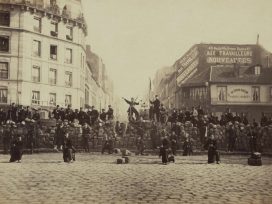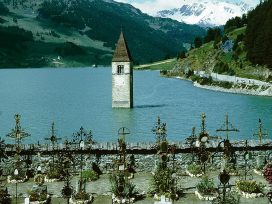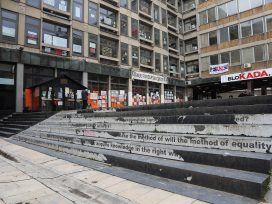Coup attempt or assertion of supremacy? It is still not clear what has happened in Kazakhstan. Whatever the case, the hijacking of the demonstrations has severely damaged prospects for the country’s democratization.
By the time the western observer, hardly even aware of Kazakhstan’s existence, had registered the popular upheaval in the country, the demonstrations in the former capital Almaty had escalated violently. Although news got past the informational blockade only sporadically, reports came that the police had withdrawn entirely on 5 January.
Almaty was left to stand alone against rioters and looters, who took control of the airport and town hall, setting the latter on fire. In the neighbouring city of Taldykorgan, protesters tore down the statue of the former president Nursultan Nazarbayev, who had ruled the country since 1990, until stepping down in 2019 to become a grey eminence as head of the Security Council.
In response to the unravelling events, the current president Kassym-Jomart Tokayev immediately dissolved the government, whose economic decisions had triggered the protests. He also swiftly took control of the Security Council and fired a few key figures of power, including Karim Masimov, the long-standing chief of the National Security Committee.
Inviting foreign troops
Next, Tokayev called for the intervention of the Collective Security Treaty Organization (CSTO), a post-Soviet military alliance comprising Kazakhstan, Kyrgyzstan, Armenia, Tajikistan, Belarus and, most prominently, Russia. In truly blitzkrieg speed, pro-government TV-stations in Russia were broadcasting videos of troops boarding an airlift and motor convoys leaving for and entering the theoretically sovereign state. Tokayev had thus opted for military intervention as the safe way to resolve the crisis.
It was only with Russian troop relocations that broad audiences in the West started suspecting that something was happening. Belarus, too, joined in the effort, sending forces who only recently had proved themselves effective in the brutal suppression of protests at home.
The following day passed in fearful expectation, with only shreds of news filtering through the blockade. Tokayev released a statement blaming the escalating violence in Almaty on the involvement of the unnamed foreign forces – a familiar trope of Russia and Belarus, but not until now of Kazakhstan.
He also released an order for the police and troops to clamp down on both looting and protests, including explicit permission to shoot ‘bandits’ and ‘terrorists’. A few reports followed on the ‘elimination’ of such ‘terrorists’ and the military suppression of protests. Later it emerged that between 3000 and 6000 people had been detained.
Around the same time, a video was released featuring a badly beaten man. Quite in the spirit of the ‘confessional’ videos released by the Belarusian security services ever since the 2020 protests there, he claimed to have been sent from abroad and paid $200 to take part in the violence and looting.
Unfortunately for the Kazakh authorities, the man was immediately recognized as a well-known jazz musician from Kyrgyzstan, who had been reported missing by his friends and family. After an official protest from the Kyrgyz government, the musician was released and sent home.
Over the weekend, the internet was restored for a few hours. A service message was circulated via messengers on locally operated SIM-cards informing their holders that the internet would be available daily between 9:00 and 13:00 and 17:30 and 19:30. From Tuesday, 11 January, this remarkable generosity was extended to the whole day, at least in the west of the country, where the protests had started and which had remained peaceful throughout the previous week.
Also on Tuesday, Russian-speaking media reported that a few high-ranking officers of the state security service, former associates of Nazarbayev, had ‘committed suicide’, while others had been detained on charges of high treason, like Karim Masimov shortly before. Finally, Tokayev released a public statement announcing that the CSTO had completed its task and that its troops would be withdrawing from state territory within two days.
What really happened?
At this stage, more questions arise than can be answered. Are we dealing with one, two or many events? Was it the case of a wave of protest exploding in violence, which was and is being severely repressed by the authorities? This would imply that Kazakhstan’s leadership had panicked – a possibility, although these were not the first protests in the country.
However, this interpretation does not explain the drastic changes in the highest ranks of politics and security services. Nor does it explain why local reporting consistently avoided calling the current capital of Kazakhstan by its new name Nur-Sultan – after Nazarbayev.1
Tokayev’s still very guarded statements concerning the power of Nazarbayev-bred oligarch groups for the first time explicitly connected the name of the country’s first president with forces that had unlawfully accumulated excessive economic and political power. In his public statement on 11 January, Tokayev had appealed to these forces to ‘pay their due to Kazakhstan now’ and contribute to the national economy on a regular basis.
Such statements suggest that the transition of power from Nazarbayev to Tokayev has finally been accomplished, and that Nazarbayev affiliates will now either be detained or they will have to prove their loyalty to the current president. Whether Nazarbayev-circles had sought to cling to power via a coup, or by hijacking the protests, is not clear. Conversely, Tokayev may himself have used the protests to assert his supremacy.
The clash of the two sovereigns would certainly have counted as warranting the invitation of CSTO troops. In order to lure the CSTO states, above all Russia, it was necessary to use a political language familiar to their leaders. This would explain the rhetoric of foreign interference, as well as the repressive measures – to which the poor jazz musician fell victim, along with many others.
Getting the foreign troops to leave will nevertheless require high diplomacy on a Machiavellian scale. Whether the Kazakh population is ready to tolerate CSTO soldiers in their country is a crucial question.
The government currently enjoys a degree of informational domination unthinkable in most parts of the world. Time will tell whether this proves helpful in establishing a narrative favourable to Tokayev and his new government.
The large majority of the population has no experience of a truly open political system, an essential and everyday part of which is peaceful protest. The protests were definitely a hopeful sign; yet the looting and rampages disqualified them in the public eye. Under these circumstances, little hope remains for a rapid and peaceful transformation of political culture and institutions in Kazakhstan.
The city was renamed Nur-Sultan by Tokayev in 2019, having been called Astana since 1998. Before that, it was called Akmola, a local name translatable as a ‘white grave’. During the Soviet era, the town was named Tselinograd, referring to Khrushchev’s virgin lands campaign of the 1950s. The very first name was Akmolinsk, when the site was a borderland fortress of the Russian Empire. According to one witticism circulating on Twitter, any Kazakhstan expert unable to cite at least the last three names of the current capital was not worth listening to.
Published 15 January 2022
Original in English
First published by Eurozine /
Contributed by Transformative Blog, RECET © Anastassiya Schacht / RECET / Eurozine
PDF/PRINTNewsletter
Subscribe to know what’s worth thinking about.
Related Articles

Debate around the cultural sector’s structural inequality often ignores issues of class. Yet behind the success of many practising artists lies an inheritance, allowance or other class privilege. Eight portraits of Belgian artists seek literary revenge, breaking into cultural capital’s invisible economy.

Since the collapse of Novi Sad’s train station in November, student-led protests have erupted across Serbia, inspiring a nationwide movement against corruption.





